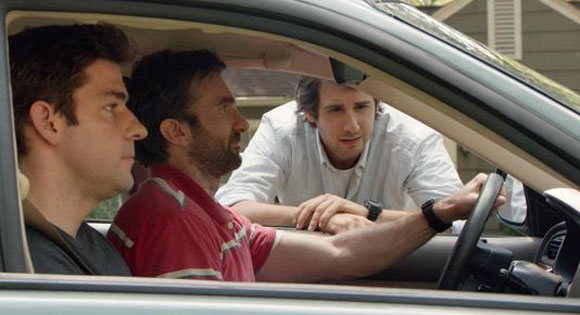"The main emotion of the adult American who has had all the advantages of wealth, education, and culture is disappointment."
— novelist John Cheever
The Hollar family reside in Middle America where they are all busy picking up the pieces of their broken lives. You could call them a dysfunctional family but that would not do justice to them and the genuine struggles they are facing in their souls. Director John Krasinski and screenwriter James C. Strouse have fashioned a dramedy that seeks to speak directly to the emotional crises that the members of this family are dealing with as they face death, divorce, bankruptcy, marriage, and parenthood.
Years ago, psychologist Carl Gustav Jung asked: "Are there schools for forty year olds to prepare them for the second half of life?" One of the best places for such instruction is in the movies. When we speak of "middle age," we are referring to a stage of mind rather than a span of time. Here are a few signs of middle age: Do you have a sense that you've been through it all before? Do you feel that you missed your chance to be all you were meant to be? Are you worried about being unemployed, failing in your work, or running out of money? Do you feel you have not been a worthy partner in your main relationship? Have you starting thinking a lot about death?
"Feelings make up a language all their own. When they speak we are compelled to listen — and sometimes act — even if we do not always understand why. Not to be aware of one's feelings, not to understand them or know how to use or express them is worse than being blind, deaf, or paralyzed. Not to feel is not to be alive. More than anything else feelings make us human."
— David Viscott in The Language of Feelings

John Hollar (John Krasinski) is an illustrator who works in New York City; he's been working on a graphic novel but feels that has failed to become the creative person he thought he would become. He is in an intimate relationship with his pregnant girlfriend Rebecca (Anna Kendrick) who is very rich. Lacking the self-esteem needed for action, he has not yet asked her to marry him. She is patiently waiting for him to make this important commitment.
John has not kept up with his family but when he learns that his mother Sally (Margo Martindale) is ill and has been taken to the hospital, he flies home. John is emotionally rocked when the family members are told that Sally has a brain tumor which must be removed. He tries to be helpful and in a touching scene, shaves his mother's head in preparation for the operation. She jokes with him saying, "I'll look ridiculous. I'll look like Rod Steiger." He also spends an uncomfortable evening with Gwen (Mary Elizabeth Winstead), his high school sweetheart who is now married to Jason (Charlie Day), Sally's sarcastic and awkward nurse at the hospital.
"Feelings like disappointment, embarrassment, irritation, resentment, anger, jealousy, and fear, instead of being bad news, are actually very clear moments that teach us where it is that we're holding back. . . . Those events and people in our lives who trigger our unresolved issues could be regarded as good news. We don't have to go hunting for anything. We don't need to try to create situations in which we reach our limit. They occur all by themselves, with clockwork regularity."
— Pema Chodron in When Things Fall Apart

John's father Don (Richard Jenkins) is a battered male who is facing multiple crises. He is terribly frightened that his wife will die, leaving him alone and helpless in the world. He can't get a loan from the bank and so his plumbing business is facing bankruptcy. And he doesn't know what to do about the mess his oldest son Ron (Sharlto Copley) is in — he is out of work, divorced, and living at home. His ex-wife Stacey (Ashley Duke) is dating Reverend Dan (Josh Groban), a youth minister who walks the talk of love and works out a way for this wayward young man to see his two daughters regularly.
The Hollars are forced by circumstances beyond their control to come to terms with their unresolved flaws, issues, and failings. They learn that they have to take things as they come to them and, as one character says, "You won't know until you get there that you're okay." Disappointment, we learn from this dramedy, gives us the opportunity to become people of more humanity, depth, character, and compassion!
